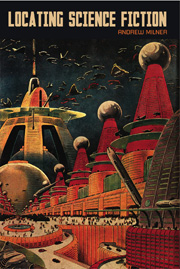Book contents
- Frontmatter
- Contents
- Acknowledgements
- List of Figures
- 1 Memories of Dan Dare
- 2 Science Fiction and Selective Tradition
- 3 Science Fiction and the Cultural Field
- 4 Radio Science Fiction and the Theory of Genre
- 5 Science Fiction, Utopia and Fantasy
- 6 Science Fiction and Dystopia
- 7 When Was Science Fiction?
- 8 Where Was Science Fiction?
- 9 The Uses of Science Fiction
- Works Cited
- Index
3 - Science Fiction and the Cultural Field
- Frontmatter
- Contents
- Acknowledgements
- List of Figures
- 1 Memories of Dan Dare
- 2 Science Fiction and Selective Tradition
- 3 Science Fiction and the Cultural Field
- 4 Radio Science Fiction and the Theory of Genre
- 5 Science Fiction, Utopia and Fantasy
- 6 Science Fiction and Dystopia
- 7 When Was Science Fiction?
- 8 Where Was Science Fiction?
- 9 The Uses of Science Fiction
- Works Cited
- Index
Summary
In the previous chapter, we explored Williams's notion of selective tradition. Here, I want to propose Bourdieu's model of the literary field as a possible, perhaps even necessary, complement to Williams in our understanding of genre. For Bourdieu, as we noted in chapter 1, even apparently disinterested and gratuitous practices can be treated as directed towards the maximisation of material or symbolic profit. When applied directly to literature and art, this proposition produces a model of ‘the field of cultural production’ as structured externally in relation to the ‘field of power’ (Bourdieu, 1993, 37–38) and internally in relation to two ‘principles of hierarchization’, respectively, the ‘heteronomous’ and the ‘autonomous’ (Bourdieu, 1993, 40–41). The external relation to the field of power is Bourdieu's formulation of what Williams, after Gramsci, had referred to as hegemony and need not detain us here. But the internal relations are less obviously equivalent to ideas available in Williams. These principles of hierarchisation are alternative ways of allocating value. Bourdieu argues that the modern literary and artistic field is a site of contestation between the heteronomous principle, which subordinates art to economy, and the autonomous, which resists such subordination (Bourdieu, 1993, 40). The latter is quite specific to the cultural field: ‘the theory of art for art's sake … is to the field of cultural production what the axiom “business is business” … is to the economic field’ (Bourdieu, 1993, 62).
- Type
- Chapter
- Information
- Locating Science Fiction , pp. 41 - 67Publisher: Liverpool University PressPrint publication year: 2012



